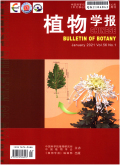植物学报2024,Vol.59Issue(5):752-762,11.DOI:10.11983/CBB24008
拟南芥光敏色素突变体种子萌发的光温敏感性
Photothermal Sensitivity of Phytochrome Mutants During Seed Germination in Arabidopsis thaliana
摘要
Abstract
The phytochrome gene family play a critical role in mediating photothermal responses during Arabidopsis thaliana seed germination.Here we evaluated the germination rates of phyA,phyB,phyC,phyD,and phyE single mutants under 12 different light and temperature regimes,using wild-type(Col-0)seeds as controls.Our results indicate that phyA mutant seeds germinate under red light but are inhibited under far-red light and high temperatures(35℃).phyB mutant seeds germinate at low(15℃)and moderate(25℃)temperatures under both white light and far-red light,but not at high temperatures(35℃).phyC mutant seeds show consistent germination across all conditions except under white light at high temperature(35℃).Both phyD and phyE mutant seeds germinate at low(15℃)and moderate(25℃)temperatures,and under red and white light,but not at high(35℃)temperature,darkness or far-red light.These observations suggest that phyB,phyC,and phyD mutants may have impaired integration of light and temperature cues,whereas phyA and phyE mutants appear to maintain this integrative function.Overall,our findings demonstrate that mutations in phyto-chrome genes can modify seed germination adaptability to varying environmental conditions.关键词
光敏色素/拟南芥/种子萌发/光质/温度/生态适应性Key words
phytochrome/Arabidopsis/seed germination/light quality/temperature/ecological adaptability引用本文复制引用
罗燕,刘奇源,吕元兵,吴越,田耀宇,安田,李振华..拟南芥光敏色素突变体种子萌发的光温敏感性[J].植物学报,2024,59(5):752-762,11.基金项目
国家自然科学基金(No.32060512,No.31860420)、贵州省科技计划(No.黔科合平台人才[2018]5781号)、贵州省粮油作物分子育种重点实验室项目(No.黔科合中引地[2023]008)和贵州省高等学校功能农业重点实验室项目(No.黔教技[2023]007号) (No.32060512,No.31860420)

